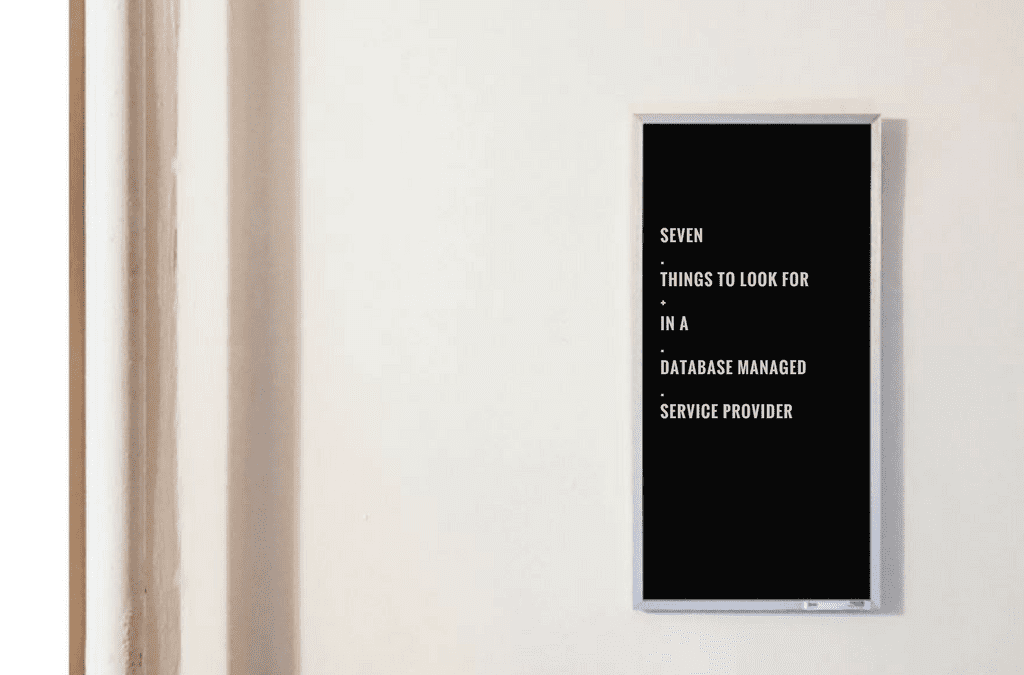You’ve decided to outsource the support of your databases, you’ve shortlisted several database managed services providers that have the right technical credentials and the price is right, what could possibly go wrong? Well quite a lot actually, remember you are trusting this company with your data.
Working with a new Database Managed Services partner will invariably require investment both in time and money but will be worth it if you choose the right organisation. Our 20 years of experience in delivering 24*7 DBA services has taught us that having the right people and processes in place typically allows for a strong and long-lasting relationship to be formed. Include the below in your supplier selection process and it should help you sort out the wheat from the chaff.
1. Security, security and more security – You are about to allow a 3rd party supplier to manage one of your most important business assets, your database. The supplier may have provided a compelling proposal but you need to be absolutely sure all of their service delivery is backed-up by rigorous security management. A formal ISO 27001:2013 accreditation should be top of your list for supplier vetting alongside a relevant statement of applicability, but also ensure DBA’s are based locally and security checked through SC Clearance or at least BPSS.
2. On-Boarding Obsession – The aspect of service delivery that our customers tell us that their previous support providers have got wrong time and time again is the on-boarding of systems. Sounds simple doesn’t it? You agree a date for the service go live and you just need to be comfortable that monitoring is in place and there’s a help desk available at the end of the phone. This is the approach we’ve seen fail on numerous occasions so make sure you insist your partner is obsessive about getting the take-on processes 100% pinned down to enable a smooth transition.
3. Beware the Vendor Hugger – Many database managed services providers normally work closely with the software vendor. That in itself isn’t a problem but make sure the providers revenue isn’t jacked up on licensing sales vs managed services. A licensing dependent provider, will be looking to drive software revenue to maintain company growth and that may not be the best foundation for impartial advice. Maybe you already have a mixture of databases in use, maybe you’re Oracle or Microsoft through-and-through, either way you should work with a support partner that isn’t wedded to a single vendor. As the database world evolves to cater for ever increasing volumes of data, your support partner will need to really understand the use case for differing database technologies and the associated pros and cons.
4. Architecture Authority – The fact your DBA support partner has good database skills is a given. However, do they have strategic consulting skills that enable you to re-think your architecture and make life easier from a support and management perspective? Should you consider moving to the Cloud, if so, which Cloud and how will you get there? A little pain now to re-architect systems can save a lot of time, money and sleepless nights but you need to ensure your partner has these capabilities.
5. Outcome Based SLA Love – Perhaps you’ve already had a bitter experience where your support partner made a mess of things and you then spent many painful hours arguing over SLA credits. To counter this, look for a services partner that gives you an outcome based SLA whereby you’ll only pay the monthly fee if agreed service levels are achieved. Ask the service provider to put their money where their mouth is, if they’re really confident on quality of service, they’ll readily agree to SLAs that work better for your business.
6. Contract Flexibility Is At Odds With Commission Payments – Surprise surprise, the sales person selling you the Managed Services agreement will likely be paid on the TCV (total contract value) and as such, has a vested interested in tying in your contract term for as long as possible. This is likely to be counterintuitive to the usage of your systems as you’ll flex things up and down in line with project demands. With this in mind, if it works better for you, your services partner should provide flexible term contracts with a monthly billing profile.
7. Avoid Bureaucratic BS – You need your support partner to be available, approachable and not hiding behind bureaucratic processes. Put simply, make sure they get stuff done.
There are lots of other factors to a successful Managed Services relationship but by covering the above, you should help ensure the right foundations are in place for getting the most out of your DBA support partnership.

Julian Boneham
Director
Julian brings over 20 years of experience having started his career in the UK’s Oracle distribution channel in 1997.
He co-founded Onomi in 2015 and, following Onomi's acquisition by Node4 in 2017, he co-founded N4Stack.
He's working hard towards taking over the Database Managed Services world and we think he's doing a pretty good job!
Get to know Julian better here.

